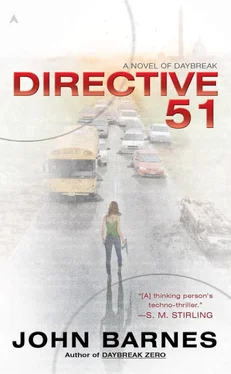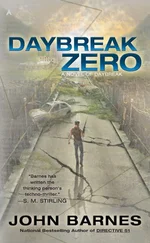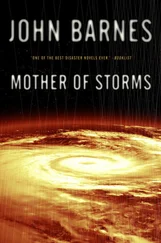One of the young women stepped forward, nervously brushed her hair away from her face, and began to read from a card. “By order of the Acting President of the United States, this company is to cease publication immediately and all staff present on the premises are to come with us. You are also to turn over all materials, supplies, and equipment to us; you may petition to have them returned when the present emergency—”
“On what charges?” Rusty asked. “And do you have a warrant?”
“We don’t need a warrant, we’re not cops, we’re here from the President,” the taller and more muscular of the two young men said. “And it’s a National Security Emergency. And you’re under arrest.”
“Read your Constitution. You don’t come onto this porch without a warrant, and if you’re going to arrest me, you have to tell me what the charges against me are—”
“Fucking Republican, it’s not your fucking Constitution,” the man said, and drew his gun.
Heather burst through the door, crouching into firing position and shouting, “Freeze, Federal police!” in one swift motion.
The young man may have just started and accidentally pulled the trigger; he may have intended to shoot Rusty Parlotta all along; for whatever reason, his gun barked, and Heather shot his head— practically textbook combat handgun, she thought, as she bellowed, “Throw down your weapons! I am a Federal agent, and you are all under arrest now. Throw down your weapons!”
Stunned, bewildered, the two young women and the surviving young man dropped their guns; Heather ran forward, bellowing, “Lie down, lie down on your faces, hands behind your backs,” and was putting the ties on the second one as she recited, “You have the right to remain silent…”
It was only as she tied the third one that she realized someone else had been shouting, and she turned to see Chris bending over Rusty, cradling her in his arms in a sort of Pieta as he tried to hold her so that she could breathe. Beside Chris, ineffectually, a man tried to stop the still-flowing, bubbling chest wound. Heather rushed to join them, but even as she did, the blood flow from the gushing wound diminished, and the dim recognition left Rusty Parlotta’s eyes; they kept trying to revive her while a runner fetched a doctor, but they all knew she was dead long before it was official.
THE NEXT DAY. BOSTON, MASSACHUSETTS. BEGINNING AT 7:00 A.M. EST. TUESDAY. NOVEMBER 5.
Election day wasn’t anything anyone had expected: It was surprisingly smooth and dull.
In the burned-out areas of Boston, soldiers walked down the street with notebooks and megaphones, asking people to come out and vote. Many of the people who came out were disappointed to find out that it wasn’t about food, or about rides out of the area, or heated shelters. But once they understood what it was about, they almost all wanted to vote. Since the printed ballots had been mostly destroyed, the soldiers hand-copied the correct spellings of the names and parties from the blackboard at headquarters, then each carried a clipboard with that sheet on it, so that voters would have something to copy correct spellings from.
ABOUT THE SAME TIME. PALE BLUFF. ILLINOIS. 6:00 A.M. CST. TUESDAY. NOVEMBER 5.
An hour behind Boston, in Pale Bluff, they all voted right on the dot of six in the morning, in the interest of giving Freddie Pranger the maximum daylight for the trip to Springfield. An old mimeograph had been found, along with a still-sealed package of mimeo sheets. A long-retired schoolteacher had figured out how to make it all work, using a turpentine/ethanol mix for fluid. They had printed up a set of ballots, and everyone promised not to peek; in the same community hall where they had all listened to a radio pulled from a sealed box and switched on just before the debate, 681 adult inhabitants and 104 adult refugees cast their ballots, sitting next to each other, filling them out all at once, careful to keep their eyes on their own ballots.
The township clerk shuffled them in a big cardboard box and started counting. An hour later, a landslide for Will Norcross was announced, and the results for local elections were written up on a whiteboard and recopied onto a sheet of lined notebook paper. While they waited, they’d all had a pancake breakfast.
Then Freddie Pranger, who had been in the Special Forces and was still a good shot, packed the results total in a small bag. He figured he’d make Springfield in three days, and depending on what he found, might be back in a week. He also carried a letter from the mayor of Pale Bluff offering to secure the roads and operate a postal service within ten miles of the town; that offer had been ratified by unanimous voice vote just before Freddie left.
They stood in the street, waving good-bye to Freddie; then people returned to their homes and jobs, with plenty to do, and nothing more about elections for the next two years.
ABOUT AN HOUR LATER. ANTONITO. COLORADO. ABOUT 10:00 A.M. MST. TUESDAY. NOVEMBER 5.
An hour behind Pale Bluff, election day in Antonito was sort of a half-holiday by common consent, with everyone taking either the morning or the afternoon off to vote, and incidentally just to enjoy having time to themselves, or to chat with the neighbors.
Voting was by secret ballot at the town council secretary’s office. She had a big sign out front:
COME ON IN AND VOTE,
REGULAR TOWNIE OR REFUGEE,
WE’LL MAKE SOMETHING WORK FOR YOU!
PUBLIC SERVICE IS WHAT I DO!
The older lady behind the desk, whose nameplate said she was SUZEE B., wore a gray beehive and glasses that made her look like she had escaped from The Far Side . She looked gray and sick, and the empty ashtray beside her probably explained it. The tobacco supply had run out, and many of the local folks were going through withdrawal.
“Here to vote?”
“Uh, yes, and we had a question—”
“Just ask when it comes up. Let’s start with your names.”
When it got down to address, Beth and Jason couldn’t very well use the commune’s old address, not knowing whether any of their old neighbors might someday come this way. Jason said, “Um, we’re refugees and the last we saw of our home—it’s not going to be there if we ever go back.”
Suzee B. looked up, nodding in sympathy, her mouth skewed a little to one side. “That sucks, don’t it?”
“Yeah,” Beth said, and her voice was choking with tears. Jason never knew when that would happen to her; most of the time she insisted on pretending nothing much had happened, but every now and then, some little kindness or attention from anyone—Jason or a stranger, it didn’t seem to matter—would completely undo her.
The lady looked at Beth, glanced at Jason, and said, “Bad getting here?”
“Bad starting out.” That was as honest as seemed safe. “Uh, what we wanted to ask was, we just rented a garage from Dave Wilson, over on Third Street? And could that be our address? So our votes count here where we’re going to make our home, instead of back where we—”
“We don’t never want to see it no more,” Beth said, wiping her eyes.
“Honey, you’re making sense to me, and I’m as much authority as there is. Dave’s at 442 Third Street, there ain’t no 444 or 446, and you’re closer to Dave than you are to the laundrymat at 448. So your garage is now officially 444. Are you a Mister and Missus yet?”
“Not yet,” Jason said, “though the thought has crossed my mind, and we’ve talked about it.”
“We been kinda busy,” Beth volunteered.
“I know how that goes. But look, just now, the whole government record system is me, so while you’re here, want to get married? I’ve got the registry right here.”
Читать дальше












